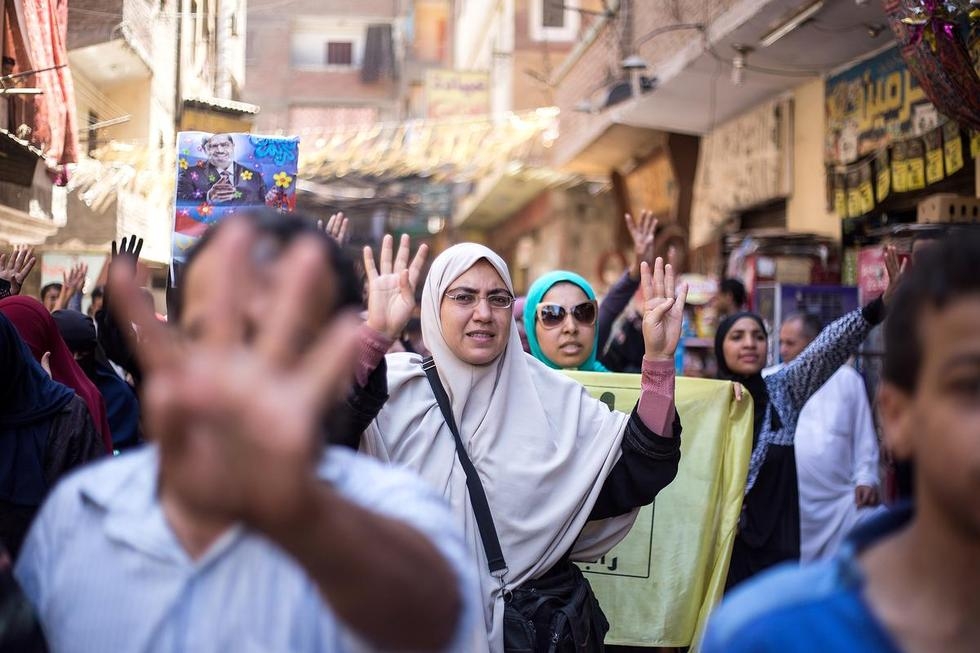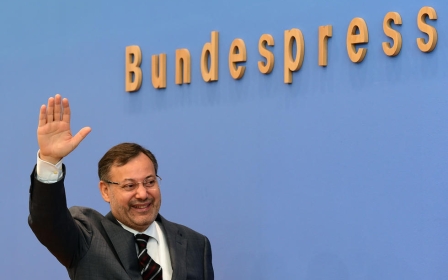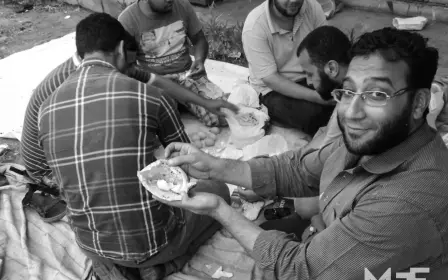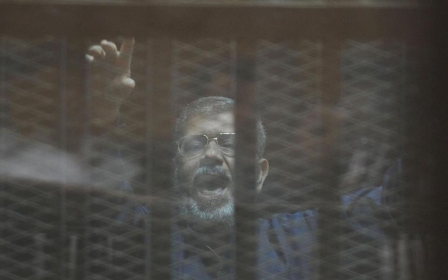For fear of Morsi, Egypt’s secularists got something far worse

On 30 June, 2013, millions of Egyptians took to the streets to demand the end of Muslim Brotherhood rule. The majority of the protesters rallying in Cairo's iconic Tahrir Square were "non-Islamists" - citizens who despite being Muslim are not from the Islamist camp - and Coptic Christians who feared the then-president Mohamed Morsi was "Islamising Egypt” – enforcing Islamic norms and values that would alter the country's moderate identity.
When democratically elected President Mohamed Morsi was overthrown after three days of military-backed street protests, millions of revellers celebrated their ''victory'' over the Muslim Brotherhood government.
Then-defence minister Abdel Fattah al-Sisi (ironically, appointed as defence chief by Morsi himself) was seen by many Egyptians as a “hero” and “Egypt's saviour”. His supporters believe that Egypt had been “on the brink of civil war” and that by overthrowing Morsi, he had saved the country from chaos and anarchy.
Egypt's Christians in particular were immensely relieved. In the wake of increased sectarian strife during Morsi's one year in office, thousands of them had fled the country, seeking asylum in Europe and the United States.
Wary of the then-ruling Muslim Brotherhood, Copts had feared Morsi would impose Islamic Sharia law in Egypt despite an article in the 2012 constitution ''protecting'' freedom of religion for followers of the three monotheistic faiths and allowing Christians and Jews to conduct their personal affairs according to their own religious laws.
Unfounded fears
On the surface, the situation of Egypt's secularists and the country's minority Coptic population under Morsi's rule may have indeed appeared worrisome. A closer look, however, reveals that the Brotherhood opponents' fears of restrictions on their civil liberties and suppression of their rights under Islamist rule were unfounded.
Admittedly, as a liberal Egyptian woman, I too, had feared that with the Islamists in power, Egyptian society would suffer serious setbacks in civil rights - and in particular, women's rights. I had even braced myself for a new and different way of life under Muslim Brotherhood rule, believing that the intertwining of politics and religion meant that Islam would dictate every aspect of Egyptians' lives.
To my surprise, this did not happen. Women were not forced to wear the Muslim headscarf or “hijab” nor were so-called “morality police” deployed on the streets - as is the case in Saudi Arabia - to harass women whose hair was not covered. While veiled TV newscasters were allowed to appear on the small screen for the first time in 2012 - under Mubarak they had been barred from appearing on Egyptian TV channels - there was no pressure on those that chose not to wear the hijab to cover up.
From the onset, Muslim Brotherhood officials sought to allay fears that the Islamist group might seek to impose strict rules that would discourage tourists from visiting Egypt. Speaking to journalists in July 2012, Essam al-Erian, then-deputy head of the Freedom and Justice Party, stressed that the Brotherhood would not take any steps that would harm the tourism industry. Tourists would not be banned from consuming alcohol, wearing bikinis, nor would men be forbidden from mingling with women in public, he asserted. He added that accusations that the Muslim Brotherhood would harm tourism were rumours circulated by remnants of the ousted regime to tarnish the image of the Brotherhood.
Indeed, contrary to the expectations of many, bars and nightclubs across Egypt remained open for business under Muslim Brotherhood rule and a widely anticipated ban on alcohol was never enforced. Meanwhile, music continued to blare from loudspeakers on Cairo 's nighttime feluccas as they sailed back and forth along the Nile River.
Rift over constitution
Asked about Sharia law in an interview that was published in the New York Times in September 2012, Morsi said he preferred to keep Article 2 in the constitution unchanged. The article from Anwar Sadat's 1971 Constitution states that the principles of Sharia are the main sources of legislation.
Egypt's ultra-conservative Salafis were at the time demanding that the article be altered to state instead that ”Sharia Law” is the source of legislation in Egypt.” The change in wording would have made the law conform more directly with literal Islamic law, allowing for strict implementation of Sharia's harsh punitive measures - including public floggings, death by stoning and amputations.
In an apparent bid to win over Egypt's liberals, Morsi refused to cave in to the demands of the ultra-orthodox Salafis. In November 2012, when tens of thousands of Islamists staged protests outside the Ittihadiya Palace, calling for the imposition of Sharia law, he dismissed the calls, saying in a televised address that “My Sharia is freedom, rule of law and social justice”.
While both the Salafi and the Muslim Brotherhood movements have the same goal in seeking an Islamic state, they differ in their strategies to attain that goal. Analysts believe the Muslim Brotherhood had ''favoured a more gradualist approach”. One of several factors that caused Morsi to fall out of favour with the more radical Salafi groups that had supported him in the 2012 presidential elections was his inability - or unwillingness - to swiftly impose Sharia.
Ironically, the constitution that was drafted under Morsi by a predominantly Islamist constitutional assembly also put Morsi on a direct collision course with Egypt's liberals, who claimed it was too “Islamist”. The liberals had feared that Article 239 - which elaborately explained the principles of Sharia - and Article 4 - stipulating that “Al Azhar has a consultative role in matters pertaining to Sharia” - would pave the way for a more theocratic approach to legislation.
'Progressive' charter hailed
In sharp contrast, lavish praise was heaped on a revised version of the 2012 charter that passed overwhelmingly with 98.1 percent of the vote in a national referendum that took place in January 2014. The new constitution was hailed as being “more progressive” than the version approved under the ousted Morsi government. The rights campaigners who hailed the new charter chose to turn a blind eye to the fact that Article 2 had remained intact, dashing the hopes of many revolutionaries who had aspired for a "secular, civil state". They also chose to ignore the arrests of political activists who had advocated a “no” vote in the referendum.
Despite the freedom of expression and assembly guaranteed by the 2014 constitution, Egypt has witnessed an unprecedented crackdown on journalists and pro-democracy activists since the ousting of Morsi in July 2013. Dozens of secular young activists and thousands of Muslim Brotherhood supporters languish behind bars for violating a draconian protest law decreed by then-president Adly Mansour in November 2013.
Meanwhile, the imprisonment of journalists in Egypt is at an all-time high, according to the New York-based Committee for the Protection of Journalists (CPJ). A prison census conducted by the CPJ on 1 June found at least 18 Egyptian journalists were being held in jail for reasons related to their reporting. Commenting on the latest census, CPJ said on Thursday that "Egypt was using the pretext of national security to crack down on press freedoms".
Disciplinary measures
And while Sisi has been regarded as the “saviour of democracy and the revolution” for safeguarding the democratic principles that liberals had feared were at risk under Muslim Brotherhood rule, the military-backed government has increasingly used religion to curb freedom of speech and assembly. In one such move, an Egyptian court this week ordered disciplinary measures against 152 workers in the southern Egyptian governorate of Luxor for a three-day strike they had staged to press for higher wages.
The workers have since been referred to a disciplinary committee that will decide their fate. In April, three state employees who had organised a sit-in at the municipality in the Nile Delta province of Menoufeya were forced to retire. Fourteen other employees who participated in the strike are also being punished by having their increments and promotions stalled for two years. The punitive measures follow an April decision by Egypt's Supreme Administrative Court to send into early retirement public employees that strike or stage sit-ins at the workplace.
The court ruled that strikes were a ''public offence'' as they halt work at state institutions, impeding the ability of those institutions to deliver services adequately. The court said it had based its decision on the teachings of Islamic Sharia, citing an Islamic tenet which ordains that ''preventing harm is preferable to procuring benefits". While the recent court ruling may have a deterrent effect on labour strikes, it nevertheless contradicts the right to peaceful assembly enshrined in the constitution.
Burning of books
At the World Economic Conference in Davos in January, Sisi had surprised and impressed world leaders and many in Western circles when he made a dramatic call for “reforms in Islamic thinking”. In his Davos speech, Sisi criticised age-old interpretations of Islam which he said had made the Muslim world “a source of destruction” and “pitted Muslim countries against the rest of the world”. His words would have had greater clout had they had been followed by concrete moves to improve the image of Islam through reforms of the educational system or granting equal rights to women.
Instead, recent images of government officials presiding over the burning of books at a school in Giza sent shockwaves across the world, giving a backward image of intolerance and ignorance. Although local education officials involved in the book-burning campaign insisted the books “incite violence and hatred,” the move was a major source of embarrassment for a government that is trying to portray a secular, modern image and position itself as ”guardian of democratic principles”.
The education minister has ordered an investigation into the incident but Dr Bothaina Kishk, the head of Giza's education directorate, responsible for the crime has insisted she was simply following “security orders that entail getting rid of books that foment violence or run counter to the principles of moderate Islam”.
Censorship of the arts
In April last year, the suspension of a film deemed “inappropriate” - not by the State Censorship Board as would be expected - but by Prime Minister Ibrahim Mehleb, prompted an outcry from rights activists who denounced the move as a “clampdown on artistic expression”. Haifa Wahbe's film Halawet Roh had been in cinemas for two weeks before it was withdrawn on grounds that it “violated public morals,” according to the prime minister and critics.
Just weeks before the film's withdrawal, the State Censorship Board had banned 20 music videos from Egyptian TV channels for allegedly “containing explicit content”. Meanwhile, in another move stifling artistic expression and creativity, a misdemeanour court in March 2014 upheld a five-month jail sentence handed down to author Karam Saber for “blasphemy and contempt of religion”. Saber was convicted over a collection of short stories that he had published two years earlier titled Where is God?
Targeting LGBT community
Calls by rights groups on the Sisi government to respect the constitution by allowing freedom of expression and assembly have so far fallen on deaf ears as the military-backed government continues to expand its crackdown on dissent. The clampdown that began by targeting Muslim Brotherhood supporters, secular pro-reform activists and journalists critical of the government has in recent months widened to include atheists and members of Egypt's LGBT community.
In March, seven “transsexuals” were arrested in a police raid on a nightclub in central Cairo. The defendants were charged with “inciting debauchery” and “violating public morality”. The arrests came hot on the heels of the acquittals of 26 men who had been arrested on similar charges in another raid on a public bathhouse in downtown Cairo. The arrest of the 26 suspected “homosexuals” had provoked a public outcry in response to a journalist colluding with the police in the raid. Reporter Mona El Iraqi who works for the privately owned pro-government TV Channel "Al Qahira Wal Nas" had tipped off the police, alleging that sex orgies were being held at the bathhouse. She unashamedly filmed the half naked men wrapped only in towels as they were dragged out of the bathhouse by police and posted their pictures on Facebook. While the “suspects” have been cleared of the charges against them and released, rights campaigners have called for Al Iraqi herself to face justice “for putting the men through the terrible ordeal” after they were subjected to humiliating anal tests.
In another controversial “debauchery case,” eight men were convicted and sentenced to three years in prison late last year for appearing in a ''gay wedding'' video that went viral on YouTube. The defendants in this case too were also subjected to the degrading anal tests to determine whether they had engaged in homosexual activity.
Violence against women
Women too have not been spared. While Egypt's 2014 Constitution is perceived as “advocating greater rights for women,” rights campaigners paint a grim picture of the reality on the ground for women. Despite an anti-sexual violence law decreed by President Sisi shortly after his election victory - and a widely publicised hospital visit he made to a sexual assault survivor in July 2014 - there has been little progress in the fight against sexual violence in Egypt.
A shocking report released in May by the International Federation for Human Rights cites a surge in sexual violence by security forces against women since the Morsi's overthrow in July 2013. In the deeply conservative country where a girl's chastity is the family honour, stripping a girl of her virginity brings shame to her entire family. This explains why sexual violence continues to be used as a tool of political repression in Egypt. First-hand testimonies and recent reports of rape, torture and other rights abuses inside Egypt's prisons indicate that sexual violence is being used to humiliate political detainees and at times force them to admit to crimes they have not committed, rights groups say.
Altering Egypt's 'moderate' identity
The string of rights abuses committed by the regime are clear violations of the rights to freedom of thought, expression, assembly and creativity enshrined in the 2014 constitution. The government's failure thus far to protect civil liberties and the repressive tactics it uses to clampdown on free speech under the guise of “national security” can only backfire. Trying to appease Gulf allies by adopting tactics of oppression used by some of those states will not only strip Egypt of its characteristic “moderate” identity, it is also proving to the millions of Egyptians that supported the removal of the Islamist government that the current regime is in many ways more extremist than the moderate Islamists they overthrew.
- Shahira Amin is a Cairo-based independent journalist who has won several international awards including Spain's Julio Anguita Parrado Journalism Award in 2012 and the Global Thinkers Forum's Excellence in Promoting gender equity Award 2013.
The views expressed in this article belong to the author and do not necessarily reflect the editorial policy of Middle East Eye.
Photos: Egyptians flash Rabia sign as they march during a demonstration in support of the former President Mohamed Morsi following the Friday prayer in Al Mataria district of Cairo, Egypt on June 26, 2015.
New MEE newsletter: Jerusalem Dispatch
Sign up to get the latest insights and analysis on Israel-Palestine, alongside Turkey Unpacked and other MEE newsletters
Middle East Eye delivers independent and unrivalled coverage and analysis of the Middle East, North Africa and beyond. To learn more about republishing this content and the associated fees, please fill out this form. More about MEE can be found here.





